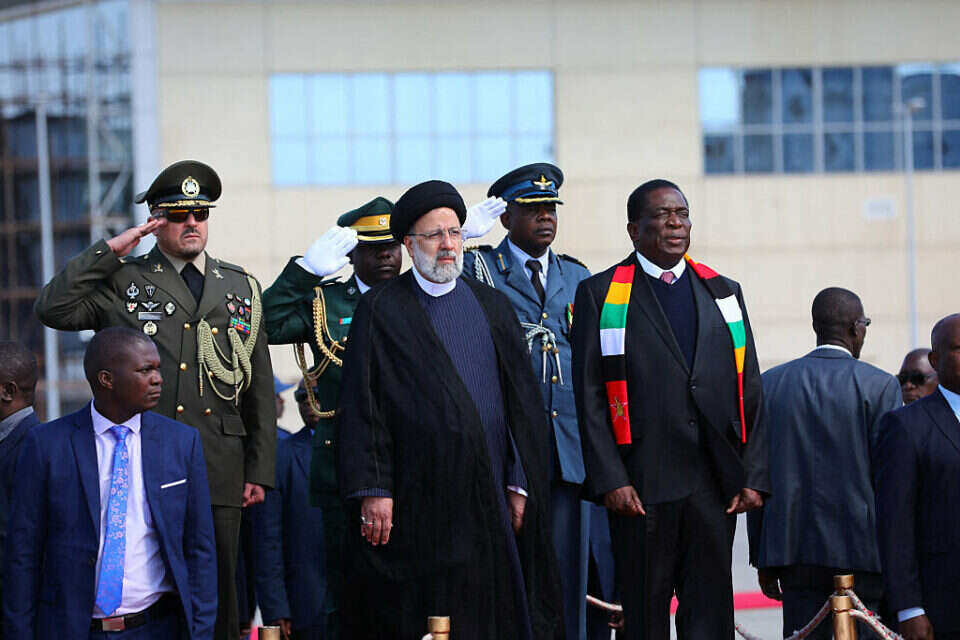
The stated goal of the Iranians is to improve the country’s economic status. The strategic goal is to strengthen the axis of countries opposed to the United States and the West. What can Israel do? Above all, it can pursue an activist foreign policy guided by the assumption that if it’s not us, then it will be someone else, and not for the better.
After renewing its relations with Saudi Arabia and the Emirates and tightening its strategic partnership with Russia, Iran is turning toward its next political objective, the continent of Africa.
Ebrahim Raisi began his political tour of Africa yesterday, the first visit in over a decade for an Iranian president. He is expected to meet with the political leaders of Kenya, Uganda and Zimbabwe. Raisi says his objective is to deepen economic cooperation between the Islamic Republic and Africa, which he sees as the continent of opportunities.
But beyond the economic objectives, it is clear that the visit is meant to sustain the political momentum Iran has enjoyed recently, to enhance its status and influence on the African continent, and to broaden the camp of those countries opposed to the United States in which Iran is the primary participant.
Renewing Relations between Countries
Only a week ago, the Iranian foreign minister met with his Sudanese counterpart, a meeting that occurred after a seven-year break in relations. According to Iranian reports, the sides discussed ways to renew relations between the countries, among other things.
As I mentioned, Sudan has participated before in Iranian efforts to transfer weapons via Sudan to Hamas in the Gaza Strip and, in this context, a number of attacks attributed to Israel were carried out on Sudanese soil. In 2020, Sudan joined the Abraham Accords, but a bilateral signing of the accords was delayed for various reasons. In the meantime, civil war in Sudan broke out again, adding uncertainty to the future of the accords.
Another significant step by Iran on the African continent was recorded two weeks ago, this time with Sudan’s neighbor Egypt.
Dynamic Diplomacy Takes Off
According to Iranian reports, Iran and Egypt agreed to renew direct flights between their countries after more than 40 years. This step, according to the reports, reflects not only the economic needs of the two countries, but also the desire to open a new page in relations, something that had been characterized for many years by hostility and tension. We cannot know how those relations will develop. As of today, Egypt reportedly authorized an easing of visa restrictions for tourists from a number of countries, including Iran. The Iranian foreign minister described Iran’s current political activity by saying that dynamic diplomacy is underway to continue the fulfillment of Iran’s national interests. The practical objective of these efforts is to neutralize the impact of sanctions imposed on Iran and to open new possibilities for improving its economic status.
However, these efforts are also intended to serve a broader strategic goal: influencing the formation of a new world order by creating a multilateral system that will balance (i.e., weaken) the weight of the United States and the West.
What Can Israel Do?
The impression is that the Biden administration is not paying attention to these developments. Joe Biden is busy with domestic issues, competition with China and the war in Ukraine. Biden’s policies in the Middle East have allowed Iran to grow stronger and have pushed Washington’s Arab friends into the laps of China and Russia.
One should not expect that these moves in Africa will stir Washington to action. What can Israel do?
Even without these developments, Iran has stayed away from Africa although it has enjoyed warm relations with important countries on the continent, such as South Africa and Algeria. Algeria is one of the few countries in the Arab world that cooperates with Iran. Recently, it made headlines following further deterioration in relations with Morocco, which were negatively impacted by the Abraham Accords as well as in light of moves in the international arena to recognize Morocco’s sovereignty over the Western Sahara.
First, Israel can fortify its foothold in African states as much as possible, particularly in those countries considered targets for Iranian efforts. Second, Israel can finalize agreements with Sudan — despite its domestic situation. Third, Israel can clarify with Egypt the significance of rapprochement with Iran as appropriate. Fourth, Israel can recognize Morocco’s sovereignty over Western Sahara.
All these things will contribute to strengthening foreign relations and weakening Iranian efforts to besmirch Israel with Islamist elements (backed by Iran and Algeria). Above all, Israel can pursue an activist foreign policy guided by the assumption that if we, Israel, are not there, someone else will be, and it won’t be to our benefit.

Leave a Reply
You must be logged in to post a comment.